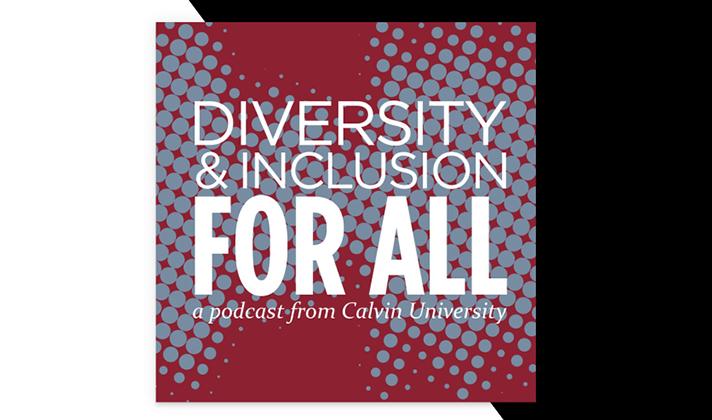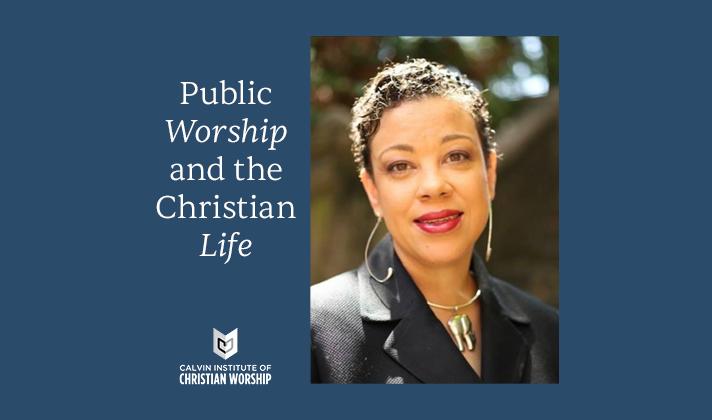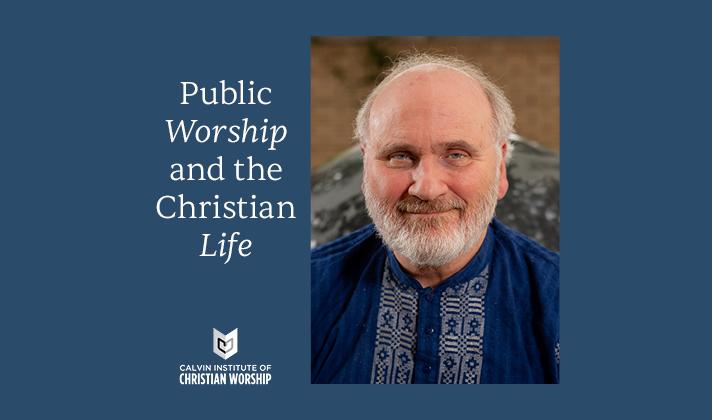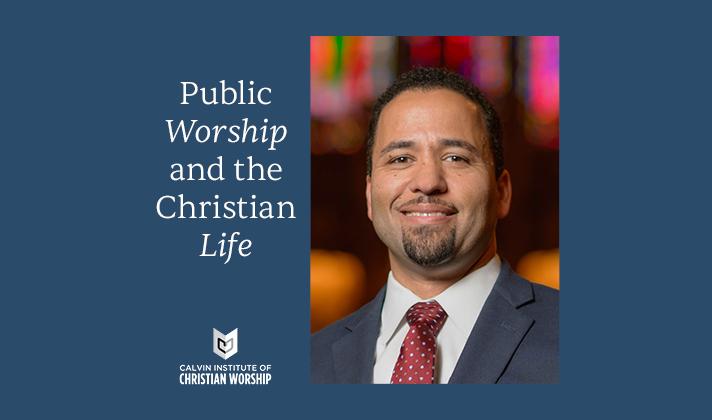Listen on Spotify, Google Podcasts, Amazon Music, Pandora, RSS Feed.
Episode transcript:
Host:
Welcome to Public Worship and the Christian Life, a podcast by the Calvin Institute of Christian Worship. In this series of conversations hosted by Calvin Institute of Christian Worship staff members, we invite you to explore connections between the public worship practices of congregations and the dynamics of Christian life and witness in a variety of cultural contexts, including places of work, education, community development, artistic and media engagement, and more. Our conversation partners represent many areas of expertise and a range of Christian traditions offering insights to challenge us as we discern the shape of faithful worship and witness in our own communities. We pray this podcast will nurture curiosity and provide indispensable countercultural wisdom for our life together in Christ.
In this episode, Kristen Verhulst talks with Khristi Lauren Adams, author of Parable of the Brown Girl, about her new book and how we all can encourage and empower the sacred lives of girls of color.
Kristen Verhulst:
Khristi Lauren Adams, it is so great to meet you, and I'm so glad to have you on the podcast today. So thanks for joining me.
Khristi Lauren Adams:
Thank you for having me.
Kristen Verhulst:
So earlier this year had your book come out: Parable of the Brown Girl. Tell us the story behind the book. Why did you write it?
Khristi Lauren Adams:
I wrote Parable of the Brown Girl to give voice to the young black girls that I've been working with in my career, but also the ones that maybe have indirectly been a part of my life, whether it's through mentoring, even outside of a job. So I wanted to share their stories in general.
Kristen Verhulst:
Wonderful. And maybe you can tell us too, we didn't get an introduction at the very beginning, but tell us about what you do right now and where you're working and doing your ministry work.
Khristi Lauren Adams:
Right now I live and work at a boarding school called The Hill School. I was hired here as the Firestone Endowment Chaplain, and also I work as a religious studies faculty here, but I'm also the interim director of Diversity, Equity, and Inclusion. So that's actually something that's fairly new. I was doing some co-partnering work in Diversity, Equity, and Inclusion as more of a co-director my first two years, and this past summer that person left, and then I took on that role, that added role. So I'm juggling those three things mainly, but also when you work at a boarding school, you are responsible for the kids pretty much all day. We all live and work here. So I'm responsible for a group of about 20 to 22 girls, so we have dorm responsibilities, and then also an advisor for eight kids. So there's always these little things, but my main main role is the chaplain of the school.
Kristen Verhulst:
What has been the response to the book? What have you been hearing from people who are reading it and talking about it?
Khristi Lauren Adams:
People have been kind. You never know, you don't know you when you write a book you're writing for an audience of one, you know, and I think those that are in the PhD world as scholars, I mean, they know that they're writing differently for research purposes, but I'm not necessarily in that world. And so when I wrote, it was just me that was reading it and watching it. So you're never quite sure how people are going to respond. But I did want to make sure that the girls, even though their stories were anonymous in the book, I know who these girls are, and I did want to make sure that they felt like they were represented the best.
And I think generally I've had some positive reactions, but the most important reaction that I got was I was here; she was right here in this very spot--I am in my apartment now--and one of the girls that I wrote about was a student here that I was working with, and when I had my first manuscript printed out, but I had chapters laying around, and her chapter was on the table, and I was in the kitchen and she said, "Is this my chapter? Can I look at it?" And I was like, sure. I was talking to a friend of mine, and then I looked over maybe 20 minutes later, maybe a half hour later, and she had tears in her eyes, and I said, "What's wrong? Oh my God." And she was like, . . . "I've shared my story a lot, and I just don't feel like people hear me. And I felt like you really heard me. You really got it." I've had generally positive reactions from people, and it's not that those weren't important, but that one is the most profound to me, the one that sticks with me, and if nobody had read the book ever, then I would have felt good about it.
But the book--I got my first award for the book, which I'm pretty happy about, from the African American Literary Awards Show, and there was an awards show this past Saturday, and it was on Zoom because we're in a pandemic, and . . . I don't think I didn't take it seriously; it's just been a year. You know how the year has been. And I think seeing it and seeing where they were in years past, they were at the Schomburg Museum in Harlem for their show and all that, and I was like, Oh, okay, it's going to be on Zoom. And so when I log on, I remember thinking to myself--my best friend was like, "Did you--are you telling anybody about this?" And I was, "No, I'm just gonna log on." And so she wound up watching, but there were these people that popped up like Walter Mosley and Michael Eric Dyson, and there were a few people up there--I forget her name, Kylie [Reid], who wrote the book Such a Fun Age, people that I looked up to my whole life, when people who are in the literary world now [whose] books are doing well--we're on that same zoom call being honored. And that was such an honor to me. So it was humbling and bittersweet. It was a bunch of emotions, but it was . . . the first award I've gotten for anything book-wise. So I felt good about that.
Kristen Verhulst:
Congratulations. That's wonderful. As you think about the girls and others who are going to read this book, what are your hopes for how people might choose to engage the book? What is it you really desire people to take away?
Khristi Lauren Adams:
. . . I know that there are plenty of other stories. I'm not the first person to write a book about young black girls; I will not be the last person. So there's nothing new under the sun with this book. Even the things that I wrote about in the book, I've referenced other secondary sources, people whose work I've read and was influenced by. So it wasn't brand-new, but I want people to take away from it an awareness, I think, more of a sensitivity to these girls. And by these girls, I don't mean the ones that are in the book; I mean the girls that are in their communities, in this society--paying attention a bit more, not making assumptions. And also knowing that there are so many other stories of girls beyond this that I couldn't fit into the book. And if people began to be more aware and listen and pay attention--actively listen--then I'm hoping that this demographic will be a little less invisible, because they have a tendency to not just be marginalized in society, but also to be overlooked, to not be seen at all.
Kristen Verhulst:
. . . . In your role as chaplain, diversity director, teacher, have you found, having now since written the book and it's come out, anything changed for you in terms of what you now are processing from your own writing and your own teaching and work.
Khristi Lauren Adams:
I don't know if it's because of Parable of the Brown Girl. The type of work that I'm in, that we're in, you're always growing. You always need to grow; you always need to evolve. Can't stop. And that's always going to be the case. My students continue to challenge me. . . . I'm teaching a new class this year and the same class. And it doesn't matter if it's new or old, different set of students, I see something different. I teach one class called Religion and Film in Contemporary Society, and I've been watching these films the last three years, but sometimes . . . they never get old in the sense that there's always something else that I didn't see in the film before. We watched a show, a film called The Truman Show with Jim Carrey, we watched The Matrix, even Bruce Almighty, and there's just something else that I get, something else that I see. And I feel the same way about my career, about working with young people in general.
But as far as writing is concerned, I am working on a new book. I'm gonna say it doesn't get any easier. I feel it was difficult the first time for a bunch of reasons--you don't have time, it's just--a lot's happening. Unless you're on a summer vacation, not in a pandemic, at a beach house somewhere and you're making money to be there, it's not going to be a pleasurable experience because of other responsibilities, but the process of writing--I don't put the pressure for the process to be the same because I realize everybody's process is different and organic, but I still go through the same imposter syndrome cycle of every chapter, is this good? Is it not good? You know, it's I'm back to an audience of one, but there is a--going back to the work that I do--there is an authenticity that young people have beyond race and ethnicity, that always challenges me to be as true to myself and to the work as possible. But as I work with young people now, it forces me when I'm writing to make sure that I'm bringing that same energy to the page.
Host:
You are listening to Public Worship and the Christian Life: Conversations for the Journey, a podcast produced by the Calvin Institute of Christian Worship. Check out our website at worship.calvin.edu for resources related to this topic and many other aspects of public worship.
Kristen Verhulst:
Here at the Calvin Institute of Christian Worship, we are about the study of worship, but then also about the practice. And so let's take it into the Sunday-morning worship experience or the weekly worship experience for so many churches and worshiping communities all across North America. What difference do these stories make to these pastors, youth group leaders, youth ministers? How should they preach differently or lead prayer differently? How do we sing better, that better recognizes these very, as you put it, sacred lives, these important lives in our communities?
Khristi Lauren Adams:
I talk about the imago Dei, the image of God, in the book a lot, about these young black girls being made in God's image, and not us generally saying that, but seeing them that way and also treating them that way in practice. But imago Dei is a term that I try to live by. I have to continue to remind myself--and we all do. When I worked at Azusa Pacific University [APU] in California, . . . it was a diversity training day they had for student leaders, but it was called Imago Dei Day, for lack of a better--I mean, no pun intended, or maybe there is a pun intended, I'm not sure--but it was image of God. And I was like, Oh, that makes so much sense. Of course, a day devoted to diversity and equity and inclusion is called Imago Dei, like duh, right? We're all made in the image of God. I don't see why we haven't picked that up much more, that correlation. I should be hearing it in the same sentence all the time, right? Because that is quite literally what imago Dei is. . . .
And it's funny how many people of Christian faith have read my book and said, "Explain to me this 'imago Dei,'" . . . and then I go and explain it and I'm happy to do that, but I'm also kind of sad because--not that we all need to know Greek, but the substance, the content of the term and what that means--if we heard enough of that--we can't hear enough of it from the pulpits and the youth groups. I think that would help us when it comes to these conversations around diversity in general. So I'm hoping by bringing that up in this book and by pushing that in general--again, nothing new under the sun; it was taught to me--that we'll begin, like you said, as pastors and youth group leaders, to be much more sensitive and mindful of our context. If I'm preaching and I'm looking around the room--in a non-pandemic world, a crowded room--and I'm looking around the room and there are these multiple, we talk about multiethnic faces, then why is our preaching so narrow?
If it's about the imago Dei, then our preaching and our preparation for that takes that in mind and is more sensitive to that context as opposed to saying, "Well, we're all one," which is sort of the scapegoat. It's hard work to preach to that context and to speak into the uniqueness of each person represented. It's really difficult. And I think we've taken, the church has taken, the easy road out by saying, "Well, we're just one." Yeah, I get it; yeah, Paul said it, fine, but you're missing that Father, Son, Holy Spirit--Trinity, like, "Oh, well, they're just all one." No, we work within the nuances of that, so why can't we work within the nuances of the diversity of the body? . . .
I self-published this book years ago called The Misinterpreted Gospel of Singleness. Part of it is about how it's single/married and how we don't recognize the diversity of people's relational backgrounds in church, just in general, how there are single women who are recently divorced, who are single parents, widows, don't want to get married again, or maybe trying to get married again. There are young single women, then there's older single women--not just women, but you know--and then there are people in marriages who are separated or trying to figure out how to get out or stay in. There's just there's such diversity in that, yet [we're] so "one or the other." But it's difficult to preach that. You have to be prayerful and mindful and intentional.
My boss at APU, I always credit him because whenever I preached, we always had these images behind us that we would send to our media group . . . if we were talking about a scripture or something, but he's, "If you're going to use an image, it needs to be different people, different representation up there. . . ." I'm very careful about when I put out Jesus. I put out different images of Jesus when I speak. If I want to say we're all made in the image of God or whatever, I'm going to make sure I'm not going to just have a white face up there." And then I started being more intentional about my preaching. So to bring that back, I hope that something like Parable can contribute to that, allowing people to be more sensitive to the different types of people in their context. And not just . . . recognizing they're in the room, but also acknowledging them and how they practice their worship.
Kristen Verhulst:
Yeah, and the amazing diversity in all lives, but especially Black lives, Brown lives, and it's not this monolithic kind of culture, but it's this broad diversity. So I want to take it even a little bit more. This is Parable of the Brown Girl, so it's Black lives and it's Brown lives, but it's the lives of women, of young women. What about the role of the woman's voice in the worshiping community and the church? That's been another, I think, marginalized voice. And now we're pairing together Black voices, which have been marginalized, and female voices together in these young girls. So what message of encouragement or hope do you want to bring to young Black and Brown women who are part of the church and will be leading in our worshiping communities.
Khristi Lauren Adams:
I tried really hard in the book to continue to bring it back to this fact that the divine lives within them, right? And I was extreme in that spiritual language on purpose because it's not just "God loves you." It's "God's in you"--and that's different. And I don't know if they've received "God loves you" to that extent, because a lot of times the representatives of God aren't doing a good job loving, so they don't really understand God's love. And it's not to negate that message, because it's very important, but I do think . . . I brought up the scripture "Do you not know that your body is a temple of the Holy Spirit" (1 Cor. 6:19) and how that's being used when it comes to women and girls, purity culture, right? It's been all about sex, that scripture. And that's what women are sort of made to think when they hear that scripture. But I was like, can we listen to that again? I wrote about it and I said, "Your body is a temple of the Holy Spirit. That's a big deal. You know, we've used it as 'It's a temple, so don't do this,' but not enough emphasis on the Holy Spirit lives in you. And that's a big deal." And I stop there.
I talk about . . . Proverbs 8 about wisdom calling out in the streets and how wisdom is personified as a she--Sophia. I feel in seminary, I originally got that from Brian Blount. I know Dr. Blount is going to be a guest up here, but Dr. Blount was a professor of mine at Princeton. In a few classes, he used to talk about Sophia a lot. And so I've got to credit him with this idea that you are wisdom personified, and Sophia is inherently divine. The wisdom of God is in you. I have to keep pushing that narrative, have to keep putting that there, because I want them to walk away and feel that confidence when you're like, wow, God lives within me. There's a different level of confidence that you walk with. Taking it back to my Religion and Film class, the Bruce Almighty film--have you seen Bruce Almighty?
Kristen Verhulst:
I have not seen that film.
Khristi Lauren Adams:
Oh, you've got to see it! Jim Carrey, he gets God's powers, right? That's basically what it is; there's not a lot to it. And Morgan Freeman is God; he's got that perfect voice. But Jim Carrey is complaining the whole movie, in the beginning, and he's mad at God all the time. And so Morgan Freeman comes in and he says, "You can have my powers. Go, have fun," or whatever. So in the beginning he's scared, and then he realizes, "Oh my gosh, I've got God's powers." And then Morgan Freeman comes back and talks to him and says, "Look, you can do everything; you just can't interfere with free will."
But anyway, the point I'm trying to make is, finally when he has the second conversation with God, he's, "All right!" And then they play the song "I've Got the Power," and he's walking around and he's just doing all this stupid stuff, but he's walking all extra-confident because he's got this power now. And it's really funny, it's a comical movie, but it's the image that I get when people realize like, "Wow!" And by the end of the movie, he realizes that he didn't need to have God's power in order to help people, in order to effect change, in order to even change his own life. It wasn't about God's power. And he can walk around with that same level of confidence. So I just really want these girls--I want all my students, but these girls in particular--to know that even though they may not have society's approval or affirmation, that they have God's affirmation, and not just in that God loves them, but also that God has literally empowered them.
Kristen Verhulst:
Khristi Lauren Adams, it has been a delight to talk with you, and I want to commend your book to everyone. It's been a great read and a wonderful conversation. So thank you very much.
Host:
Thanks for listening. We invite you to visit our website at worship.calvin.edu to learn more about the Calvin Institute of Christian Worship, an interdisciplinary study and ministry center dedicated to the scholarly study of the theology, history, and practice of Christian worship and the renewal of worship in worshiping communities across North America and beyond.





